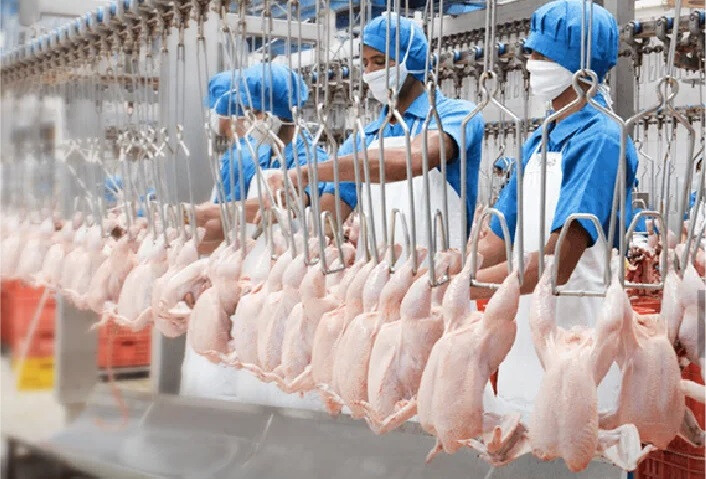
Jakarta, Indonesia – The Indonesian government has expressed its willingness to export processed poultry meat to Argentina to address its domestic chicken oversupply and to balance trade. This proposal was made during discussions about the potential import of Argentine beef and is seen as a significant step towards strengthening mutually beneficial trade relations between the two nations.
Indonesian Deputy Minister of Agriculture, Sudaryono, stated that these trade cooperation measures were discussed during a meeting in Jakarta with Argentina's Undersecretary of Livestock and Fisheries, Agustin Tejeda Rodriguez. Both sides agreed to enhance mutually advantageous trade cooperation.
Argentine Beef Seeks Entry into Indonesian Market
According to Deputy Minister Sudaryono, Argentina possesses significant production capacity, especially in beef and live cattle exports, and has proposed exporting beef to help meet Indonesia's domestic beef demand. While Indonesia has no strategic objections to this proposal, it emphasized the need for technical discussions on logistics, given the long transportation distance between the two countries.
One of the most crucial considerations is Indonesia's requirement for Halal certification, as the majority of its population is Muslim. All beef imports must comply with strict Halal standards before entering the market. This is not merely a religious obligation but also directly linked to public trust in food safety and quality, prompting the Indonesian government to demand thorough verification in this area.
Indonesia Counters with Poultry Exports
Indonesia is, in turn, seeking reciprocal trade opportunities. The government has expressed interest in exporting processed poultry meat to Argentina, considering the current oversupply of chicken domestically. Indonesia's chicken industry has seen steady growth in recent years, with production now exceeding domestic demand. This is a result of technological advancements, improved breeding environments, and government policies supporting the livestock industry. Therefore, market entry into Argentina is expected to significantly contribute to the revitalization of Indonesia's chicken industry and increase farmers' incomes.
Deputy Minister Sudaryono remarked, “The meeting proceeded smoothly. We see this as an opportunity to strengthen trade relations between our two countries.”
Undersecretary Rodriguez confirmed that Argentina’s primary goal is to gain access to the Indonesian market through beef exports. He stated that Argentina is open to increasing imports of Indonesian agricultural products in the spirit of balanced trade and deepened bilateral relations.
Argentina, one of the world's largest beef exporters, is committed to meeting Indonesia's hygiene and Halal certification requirements. To this end, relevant Argentine agencies are closely collaborating with the Indonesian Halal Product Assurance Organizing Body (BPJPH) and the Ministry of Agriculture to discuss practical measures for fulfilling Halal standards across slaughter facilities and processing stages. Furthermore, active information exchange on livestock disease management and food safety systems is also planned.
Import quotas have not yet been set. The volume of beef shipments will be determined once all legal and technical procedures are finalized. Undersecretary Rodriguez added, "We hope all procedures will be completed within this year."
Potential and Challenges in Indonesia-Argentina Trade Relations
The ongoing discussions between Indonesia and Argentina on livestock product trade demonstrate the potential to open a new chapter in economic cooperation between the two nations. Argentina boasts excellent beef quality and production capacity as a global meat producer, while Indonesia’s beef demand is continuously increasing due to its surging population and economic growth. Conversely, Indonesia possesses significant competitiveness in poultry production, which can offer new options to the Argentine market. These complementary economic structures form a foundation for invigorating bilateral trade relations.
Potential:
Enhanced Food Security: Indonesia can strengthen its domestic food security and contribute to price stability through beef imports. Argentina, in turn, secures a stable export destination.
Industrial Diversification: Indonesia can expand its poultry export market, enhancing the competitiveness and diversification of its domestic livestock industry.
Increased Economic Cooperation: The growth in bilateral trade can lead to expanded cooperation in various fields beyond mere goods exchange, including investment and technological exchange. Agricultural technology exchange, in particular, can positively impact both nations.
Diversification of Global Supply Chains: This can contribute to reducing reliance on specific countries and diversifying global food supply chains. This aspect becomes even more crucial considering recent global supply chain instabilities.
Challenges:
Logistics and Transportation: Given the vast geographical distance between Indonesia and Argentina, transportation costs and time are significant considerations. Refrigerated container transport and the development of efficient shipping routes are essential. Addressing potential quality degradation during transit is also a challenge.
Halal Certification: For Argentine beef to enter the Indonesian market, it must meet Indonesia’s strict Halal standards. This means adhering to Halal regulations not only in the slaughtering process but also throughout all stages, including transportation and storage. The Argentine government and relevant companies will likely require additional investment and effort to meet these requirements.
Hygiene and Quarantine: It is crucial for both countries to mutually recognize and adhere to hygiene and quarantine standards for traded livestock products. Strict quarantine procedures and system establishment are essential to prevent disease spread.
Price Competitiveness: Ensuring price competitiveness in the global livestock market is also vital. The final price, including transportation costs, must be attractive to Indonesian consumers and Argentine importers.
Non-Tariff Barriers: Beyond Halal certification, potential non-tariff barriers may arise. Close consultation between the two governments is necessary to minimize these barriers.
If these discussions are successfully concluded and livestock trade between the two countries is activated, it will not only bring economic benefits but also serve as an opportunity to strengthen cooperation in various other fields, including politics and culture. The convergence of Argentina, a strong agricultural nation, and Indonesia, a vast market in Southeast Asia, is expected to have a certain impact on the global livestock market landscape.
[Copyright (c) Global Economic Times. All Rights Reserved.]




























